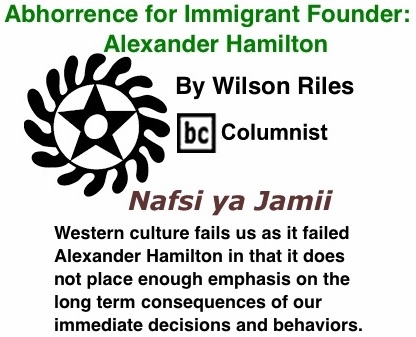




Because Alexander Hamilton is the architect of our miserable,
oppressive financial system, I hold significant animosity towards him.
I abhor this founder of our nation! My animosity for him is equal to my
dislike of Thomas Jefferson and the other founders who were slave
holders even though Hamilton opposed slavery. They all left a trail of
writings and actions that I find reprehensible. As a conscious black
citizen of the US – unlike some conservatives – I have no difficulty
making a carefully reasoned assessment of these founders and speaking
out about that boldly and loudly. I refuse to be blinded or silenced by
– so-called – patriotic mythology. But I seek to also overcome my
abhorrence.
My abhorrence is tempered by my understanding that there are no
alternatives to “going from what you know.” We make choices based on
the totality of our awareness. Western culture fails us as it failed
Alexander Hamilton in that it does not place enough emphasis on the
long term consequences of our immediate decisions and behaviors. There
is little that is comparable in Western culture to that emphasis in the
indigenous First Nations’ cultural on what is called Seven Generations
awareness: the inclusion of a consideration of the consequences of what
we do today on “seven generations” in the future.
A closer examination of Hamilton’s “leavings” does reveal unwise
individual-human shortsightedness. Such an examination also totally
destroys the conservative’s wont to make him and at least five other of
the “major founders” exceptional men. This founder mythology can be
discarded. That is a good thing. Discarding it is good not just because
it brings us closer to the truth but also because it allows a winnowing
of what deserves to be conserved as opposed to what needs to be
understood and uprooted. However, the supreme goodness of this
analytical approach derives from the example that it offers us. It
forces us to reflect with a certain amount of empathy and it goads us
to view ourselves and our contemporary leaders and heroes as – what
they are – human beings. We all can consciously and thoroughly extend
our ability to “go from what we know” and to NOT just let others, who
are as flawed as we, lead us in to ignominy.
Every white, black, and yellow person on this land is an
immigrant or the descendent of immigrants. Too much has been made, for
too long a time, of the distinction between those who happen to be
birthed on this land from those who walk across the border – whether in
chains, whether by other means forced, or whether by free choice.
Hamilton suffered from that distinction. He was one of the eight
immigrants (folks not born in the Colonies) who attended the 1787
Constitutional Convention. In the book, The Founders and Finance: How Hamilton, Gallatin, and Other Immigrants Forged a New Economy,
it posits that in large part Hamilton’s immigrant status influenced the
decisions he made. The author, Thomas K. McCraw, writes with an element
of appreciation – which I do not share. I do share the author’s
developmental character assessment of the importance of immigrant
status to Hamilton.
“To this day, no one knows with complete assurance when or where
he [Alexander Hamilton] was born, or even who his father was.” It is
believed that he was born on the Caribbean Island of Nevis, near St.
Croix. “At that time, Nevis contained about 1,000 whites and…8,000
enslaved blacks.” Alexander got the family name of a “ne’er-do-well”
that his mother lived with after she abandoned her husband and an
earlier child. Subsequently Hamilton Sr. abandoned Alexander and his
mother. Rachel Faucett, Alexander’s mother, spent two months
“imprisoned in a dank fortress” for the crime of adultery. None of the
men she spent time with were punished. After her release she opened a
small store in the port city of Christiansted, St. Croix, where she and
Alexander worked and lived. It was where Alexander learned rudimentary
lessons about business and finance. When he was nine, his mother died
of yellow-fever. Hamilton had demonstrated such a facility with numbers
that he had impressed his mother’s friends. He went on to work at a New
York-based merchant trading house there in the Caribbean.
At fifteen this white youth got the opportunity to seek his fortune in
New Jersey and to study at a Presbyterian school to complete his
education. [Up until the late 1800s when Congress wanted to keep free
people-of-color out, the Colonies’ borders and later the U.S. borders
were completely open.] In 1773 Alexander was admitted to King’s College
which is now Columbia University. “The Boston Tea Party occurred during
his first academic year at King’s College…” Hamilton’s background
disposed him to seek legitimacy, respect, and inclusion. His male
youthfulness and penchant for numbers propelled him into the gathering
storm of the War of Independence which was principally caused by
differences over taxes, trading regulations, and the economic power of
the wealthy.
He made his “political bones” on a pamphlet he wrote at this time that
attempted to make the argument that the Colonies could be economically
self-sufficient. “This assertion was at best debatable, but the essay
was an impressive debut for someone so young.” Hamilton went on to
become one of General George Washington’s aide-de-camps. He
distinguished himself in terms of his accounting and organizing skills
to the extent that Washington refused Hamilton’s frequent requests to
be given command fighting assignments. The mutual appreciation that
developed between them became critical later when President Washington
declined the request of Thomas Jefferson and others to veto Hamilton’s
Bank of the United States bill.
Conservatives who uncritically swallow the mythology about the major
founders might be surprised about some of the stances that Alexander
Hamilton took. In some of his early writings in The Continentalist
Hamilton was in “conscious opposition to the laissez-faire
prescriptions contained in Adam Smith’s Wealth of Nations.” Hamilton is
quoted as having said that “A national debt if it is not excessive will
be to us a national blessing; it will be a powerful cement of our
union.” He was the friend of U.S. resident “loyalists” who were against
total independence and who constantly hoped that the War would come to
a negotiated end and the Colonies would remain the possession of
Britain. At the Constitutional Convention Hamilton said “that the
British government was the best in the world; and that he doubted much
whether anything short of it would do in America.” Like too many of us
in the struggle are, Hamilton admired and was jealous of the power of
imperialists.
Hamilton was “going from what he knew” and from his ego needs and
hunger for social status. From an early age he had been given
desperately needed attention and appreciation for his facility with
numbers. [He was the oppositional Paul Ryan of his day.]This channeled
him to study every economic philosophy, business, and accounting text
that he could get his hands on. These were texts that expounded
economic imperialism. Additional appreciation of his learning and
skills followed which propelled him into the elite circles of the
revolutionary colonists at the age when young men seem to have the most
need for external respect.
Hamilton, being a border crosser, had less attachment to any particular
Colony or land than did Jefferson or the majority of the revolutionary
leaders of the time. Jefferson and others were agriculturalist (albeit
based on slave labor) who rejected national centralized power;
Hamilton’s experiences were at urban port communities and enterprises
that had ocean-spanning connections and high dependencies for “success”
on the manipulation of far flung nations and communities. Alexander’s
allegiance was more to the formation of a “powerful” nation (a concept)
than it was to the land or to a more definable set of people.
He was allied with those who wanted to create a powerful central
government. He was concerned with maintaining or reestablishing the
basic colonial economic structure that was dependent on international
trade, the new technologies of the industrial revolution, and the
extraction of resources from local communities. His concept of national
self-sufficiency was to break away from the British so-that the United
States could be like Britain. [This is the natural dream of most
juveniles: how can I be a daddy too.] What Hamilton knew was a Britain
which had emerged out of and which was still encrusted with the
culture, institutions, and understandings of feudal monarchy. Alexander
Hamilton set about recreating the British national model with marginal
differences but still “shot through” with much that we are told the
Colonists rebelled against: militarism, imperialism, and the lack of
true democracy beyond the elites. Alexander Hamilton’s creative horizon
was limited.
The imperialism of the financial system that Hamilton
initiated is oppressing us today. Our national government began heavily
burdened with the unpaid costs of war and massive debt owed to distant
governments; after more than two hundred years we still suffer from
that insanity. Our national prosperity is not built on the abilities
and industriousness of local farmers, merchants, and crafts-persons
serving a local market as Jefferson envisioned but on the basically
colonial-based economics of exports and imports that enrich a few
elites and that are unsustainable. Like too many public agencies in the
US, Oakland is also caught in interest rate swap deals or other
extractive debt-based mechanisms that suck millions of desperately
needed dollars annually out of the community with absolutely no
benefit: we need a national-Anti-Goldman-Sachs Tea Party. Stockton
California is only the latest city going bankrupt due to the
“fractional reserve,” central-bank, monetized-debt currency systems
that Hamilton craftily initiated. Detroit and too many mostly black
communities across the country are being oppressed and democratically
suppressed in obeisance to the centralized bankers and the debt
financing of militarism. They are being saddled with colonial viceroys
to make sure that the financial elites get their “pound of flesh.”
Even though I abhor him, I explore and attempt to understand the life
and decisions of Alexander Hamilton and the other founders of this
nation but I reject the conservatives mythologizing of them. Neither do
I consider him less than human which is the mistake of
reverse-mythologizing. [Buddhist culture is clear about the dangers of
being entangled in reactive revulsions as no better than the
entanglements in unmitigated attractions. Both lower the creative
horizon and keep the focus on limitations.] Most importantly, I will
submit myself, my colleagues, and contemporary leaders to a similar
cultural and social psychological analysis to better understand and
correct the negative impacts that our current day actions and decisions
will have on future generations. By not conserving all of Alexander
Hamilton’s limitations as if they are fundamental, my creative horizon
will be raised.

BlackCommentator.com Columnist, Wilson Riles, is a former





